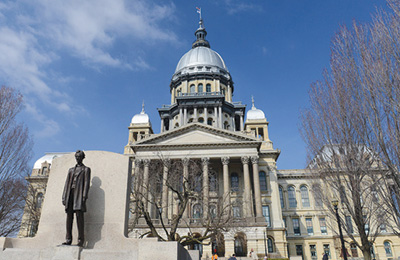Bill to block local RTW zones advances in Illinois Senate
By CARL GREEN
Illinois Correspondent

Springfield, IL – Legislation that would prohibit local governments from restricting collective bargaining by creating phony local “right-to-work” zones is moving ahead in the Illinois Legislature.
Senate Bill 1474, called the Collective Bargaining Freedom Act, was approved by the Senate on a 42-12 vote March 7 and then passed the House Labor Committee on a 21-4 vote March 20. It was awaiting a vote by the full House last week.
It is the successor to Senate Bill 1905, which passed both houses of the Legislature in 2017 but was vetoed by former Gov. Bruce Rauner. The Senate overrode the veto on a 42-13 vote, but the House could not muster the three-fifths vote needed to override, voting 70-39, short four votes.
The bill responds to the Village of Lincolnshire, near Chicago, passing an ordinance to create a so-called “right-to-work” zone. The bill states that only the General Assembly and the governor have the authority to regulate collective bargaining.
THE RIGHT TO NEGOTIATE
 Sen. Rachelle Crowe (D-Glen Carbon), a co-sponsor of the bill, said it supports economic development, protects the quality of government services and confirms the state’s obligation to produce a highly trained workforce.
Sen. Rachelle Crowe (D-Glen Carbon), a co-sponsor of the bill, said it supports economic development, protects the quality of government services and confirms the state’s obligation to produce a highly trained workforce.
“The Collective Bargaining Freedom Act solidifies the state’s commitment to provide protection for our middle-class workers,” she said. “Workers have the right to negotiate livable wages and safe working conditions without worry.”
Crowe and Sen. Christopher Belt (D-Cahokia) were co-sponsors of the bill and voted for it. Two Republican senators from southern Illinois also co-sponsored the bill and voted for it, Paul Schimpf of Murphysboro and Dale Fowler of Harrisburg.
On March 20, it passed the House Labor & Commerce Committee on a 21-4 vote. The chief House sponsor is Rep. Lance Yednock (D-Ottawa) a former business agent in Operating Engineers Local 150.
STILL FIGHTING RAUNER
Local right-to-work zones were a big part of Rauner’s “Turnaround Agenda” that also targeted prevailing wage rates. Only Lincolnshire actually voted to create a right-to-work zone, but its ordinance was struck down in federal court.
Terrence Hancock, president of Teamsters Joint Council 25, was among those who worked to overturn Rauner’s veto.
“Right-to-work states provide lower wages and experience higher incidences of workplace injury than states that reject right-to-work,” he said.


Leave a Reply